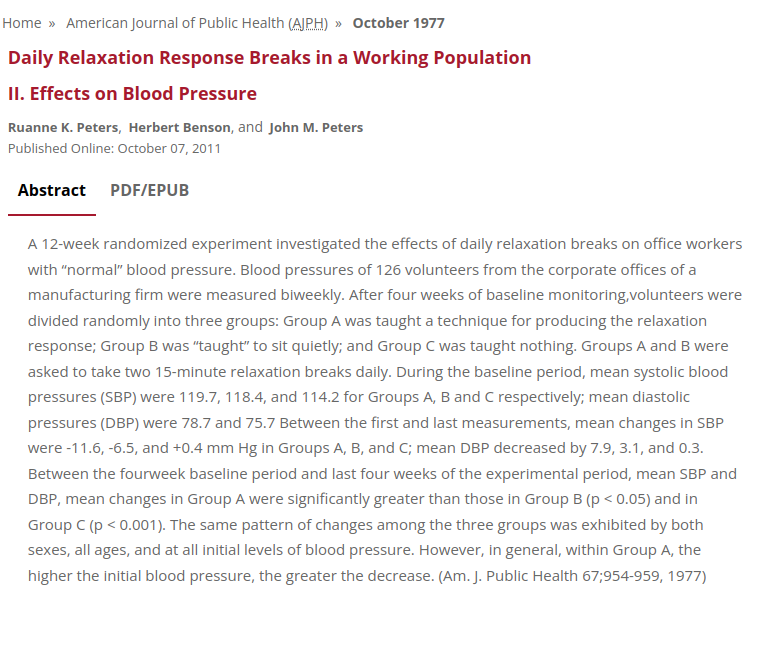A 12-week randomized experiment investigated the effects of daily relaxation breaks on office workers with “normal” blood pressure. Blood pressures of 126 volunteers from the corporate offices of a manufacturing firm were measured biweekly. After four weeks of baseline monitoring, volunteers were divided randomly into three groups: Group A was taught a technique for producing the relaxation response; Group B was “taught” to sit quietly; and Group C was taught nothing. Groups A and B were asked to take two 15-minute relaxation breaks daily. During the baseline period, mean systolic blood pressures (SBP) were 119.7, 118.4, and 114.2 for Groups A, B and C respectively; mean diastolic pressures (DBP) were 78.7 and 75.7 Between the first and last measurements, mean changes in SBP were -11.6, -6.5, and +0.4 mm Hg in Groups A, B, and C; mean DBP decreased by 7.9, 3.1, and 0.3. Between the fourweek baseline period and last four weeks of the experimental period, mean SBP and DBP, mean changes in Group A were significantly greater than those in Group B (p < 0.05) and in Group C (p < 0.001). The same pattern of changes among the three groups was exhibited by both sexes, all ages, and at all initial levels of blood pressure. However, in general, within Group A, the higher the initial blood pressure, the greater the decrease.
Daily Relaxation Response Breaks in a Working Population II. Effects on Blood Pressure
Publication
American Journal of Public Health
Abstract
Web and Email Links
Related Listings
Journal
Journal of Chronic Diseases
A prospective investigation was designed to test whether the altered behavior of the regular practice of a relaxation, meditational technique might lower blood pressure in 22 borderline hypertensive subjects. The investigation was unbiased with regard to the presence of antihypertensive agents; subject familiarity with blood pressure measurement or with the observer; observer error; and the effects of blood pressure variability. During the control period, blood pressures averaged 146. […]
Journal
PLOS ONE
Background Poor psychological and physical resilience in response to stress drives a great deal of health care utilization. Mind-body interventions can reduce stress and build resiliency. The rationale for this study is therefore to estimate the effect of mind-body interventions on healthcare utilization. Objective Estimate the effect of mind body training, specifically, the Relaxation Response Resiliency Program (3RP) on healthcare utilization. Design Retrospective controlled […]
Journal
Behavior Modification
Sleep latency changes following behavioral interventions for sleep-onset insomnia are only moderate because the majority of insomniacs do not achieve good sleeper status at posttreatment. This study evaluated the efficacy of a multifactor behavioral intervention consisting of stimulus control and relaxation-response training (n = 10) compared to stimulus control alone (n = 10) for sleep-onset insomnia. Only the multifactor subjects' mean posttest sleep latency fell within the good sle […]

